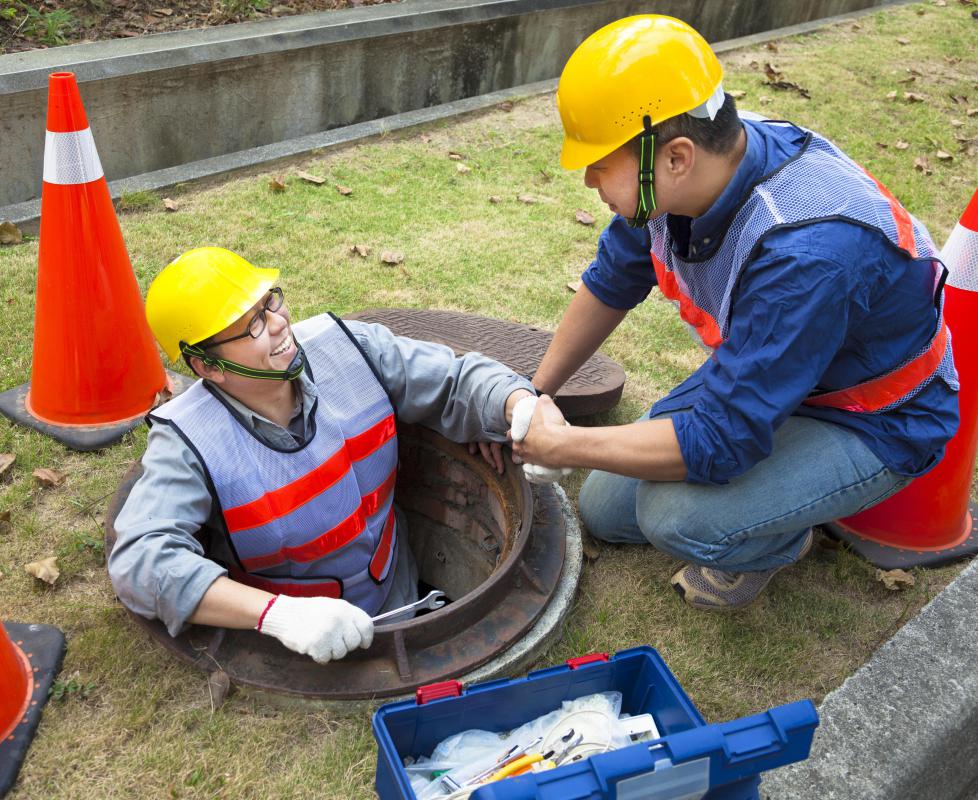At PracticalAdultInsights, we're committed to delivering accurate, trustworthy information. Our expert-authored content is rigorously fact-checked and sourced from credible authorities. Discover how we uphold the highest standards in providing you with reliable knowledge.
How Do I Become a Sewer Inspector?
To become a sewer inspector, some experience working with underground utilities is typically required. A person might gain work experience and knowledge working as an apprentice for a highway department or utility company. Technical education might also be needed when using television cameras and video equipment to examine sewer lines.
An entry-level job installing pipelines might help a person become a sewer inspector. Usually, a combination of experience and education gives an applicant a better chance of getting the job. Courses in electronics that cover the operation and repair of television cameras might also help a person get into this field. Experience operating these cameras is considered a valuable skill.

Another option to become a sewer inspector involves working for a private company as an apprentice. These businesses conduct sewer inspections for private property owners to evaluate the operation of the systems. They often perform an analysis of sewer lines for prospective home buyers concerned about the condition of a sewer system. These private companies might hire a person with no experience and train him or her.

Math classes might be useful to get a job inspecting sewer installations. Some regional governments hire sewer and water line inspectors to oversee new construction projects. These inspectors ensure utility systems are built to proper specifications and conduct field tests of materials used. They must be able to read blueprints, plans, and perform math equations.

Municipal sewer companies typically administer examinations to applicants who want to become a sewer inspector. The tests might contain questions on the installation, repair, and maintenance of sewer lines. They typically include sections on job safety issues and might test a person’s ability to come up with solutions for common problems.
Sewer inspectors work with the public by responding to complaints of faulty sewer lines. They investigate these issues using cameras to find leaks or blockages in the pipelines. Inspectors also examine sewer lines on a regular basis to determine if maintenance is required. They commonly take videos of the pipes and maintain a video library of a city’s entire sewer system.

These jobs might require working in all types of weather and answering calls after hours. People who become sewer inspectors work in confined spaces that are smelly and damp. They are required to work in heat while wearing safety protection, including headgear, goggles, and gloves.
AS FEATURED ON:
AS FEATURED ON:














Discussion Comments
@SkyWhisperer - I wouldn't knock the self study home inspection courses. Yes, they may not qualify you to be a certified home inspector, but they could help you for your own benefit.
If you are getting ready to sell your house, you can use the skills you've acquired to conduct a preliminary, heads up inspection on your own home. That will give you an idea what needs to be fixed before paying a professional home inspector several hundred dollars to give you the same information.
@allenJo - I would imagine that there is some upward mobility in this profession possible. I think you could start out becoming a sewer inspector, and then later on move up to becoming a housing inspector.
A building inspector does a thorough inspection of the facility, from the ground up, but plumbing is definitely one of those inspections. I think that training as a sewer inspector would be invaluable in that sense, in addition to any certifications that you had received along the way.
I think the training requirements might be a little more stringent to become a qualified home inspector however. The home inspector who did our house was a structural engineer by trade, so I don’t think you can do a good job in this profession by simply taking a self study course.
@hamje32 - I agree. They are on call all hours, in all types of weather. I imagine that the position would pay quite well. Generally, the less desirable yet more needful a position is, the better the pay is.
I think technology has made the job easier than it was in years gone by. I believe cameras make it easy to inspect sewer lines. They probably insert miniature cameras in the lines to do the inspection.
I know that kind of thing is done with some inspections of oil rigs when a line goes bad, so I figure they might do something similar with sewer lines.
Well, it’s a dirty job, but somebody has to do it. I’m sure not everyone aspires to be a sewer inspector, but it is definitely needed – I don’t anticipate there would be many layoffs with this kind of job.
What amazed me in reading the article is how much electrical, math and even camera experience would be required – or even be a plus – in this kind of profession. It is, after all, inspection.
While you may have to endure some nasty smells along the way, the same skills needed for any time of commercial or residential inspection would be needed here as well.
Post your comments